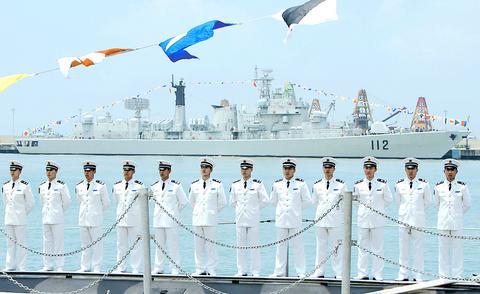China's navy sailed eight warships into Hong Kong yesterday in its biggest show of military force since the former colony's 1997 handover from Britain.
The port call is meant to boost patriotism in Hong Kong, but analysts also said China was flexing its naval muscles to send Taiwan a message discouraging any thoughts on independence.
A vice admiral did not directly address that issue when asked by reporters.

PHOTO: REUTERS
"We are always on call," said Yao Xingyuan (
Yao said the two destroyers, four frigates and two submarines are in Hong Kong until this Wednesday to commemorate the 55th anniversary of the PLA's navy.
Yao said the ships will sail through Victoria Harbor when they depart, giving the territory a good look at them, but he wouldn't say where they were heading next.
The port call comes at time when many Hong Kongers are angered by Beijing's decision to rule out full democracy here in the near future.
About 100 Hong Kong residents visited one ship yesterday morning, waving Chinese and Hong Kong flags as bands played patriotic music.
"As a Hong Konger, as a Chinese, I want to welcome my own navy," said Man Yu-ming, a 45-year-old insurance agent.
"I want to check out the equipment on the ships," said Elaine Ng, who is 50 and unemployed.
The visit was an apparent message to Taiwan, said political expert Ding Xueliang (丁學良) of the University of Science and Technology.
But Ding expressed doubts that a show of force by China would prompt any changes in Taiwan President Chen Shui-bian's (
Defense analysts said any Chinese naval attack on Taiwan would be unlikely to succeed.
China would have difficulty providing enough cover to troops to make an amphibious landing, said Robert Karniol, Asia-Pacific editor of Jane's Defense Weekly, in a telephone interview from Bangkok.
Political scientist Joseph Cheng (
The visit comes as many Hong Kong people demand the right to directly elect their leader in 2007 and all lawmakers in 2008. Many of these had their hopes shattered on Monday when Beijing ruled out such reforms.
The eight warships are the biggest group China has sent here since the 1997 handover. Two warships visited during a port call in 2001.
A PLA spokesman said the vessels are a battle group en route to a training exercise at an undisclosed location. Sailors will be allowed to tour Hong Kong in civilian clothing.
The PLA has stationed troops here since the 1997 handover, but they generally keep a low profile and stay inside their barracks to avoid alarming Hong Kong citizens.

The Ministry of Foreign Affairs (MOFA) yesterday said it is closely monitoring developments in Venezuela, and would continue to cooperate with democratic allies and work together for regional and global security, stability, and prosperity. The remarks came after the US on Saturday launched a series of airstrikes in Venezuela and kidnapped Venezuelan President Nicolas Maduro, who was later flown to New York along with his wife. The pair face US charges related to drug trafficking and alleged cooperation with gangs designated as terrorist organizations. Maduro has denied the allegations. The ministry said that it is closely monitoring the political and economic situation

Conflict with Taiwan could leave China with “massive economic disruption, catastrophic military losses, significant social unrest, and devastating sanctions,” a US think tank said in a report released on Monday. The German Marshall Fund released a report titled If China Attacks Taiwan: The Consequences for China of “Minor Conflict” and “Major War” Scenarios. The report details the “massive” economic, military, social and international costs to China in the event of a minor conflict or major war with Taiwan, estimating that the Chinese People’s Liberation Army (PLA) could sustain losses of more than half of its active-duty ground forces, including 100,000 troops. Understanding Chinese

UNRELENTING: China attempted cyberattacks on Taiwan’s critical infrastructure 2.63 million times per day last year, up from 1.23 million in 2023, the NSB said China’s cyberarmy has long engaged in cyberattacks against Taiwan’s critical infrastructure, employing diverse and evolving tactics, the National Security Bureau (NSB) said yesterday, adding that cyberattacks on critical energy infrastructure last year increased 10-fold compared with the previous year. The NSB yesterday released a report titled Analysis on China’s Cyber Threats to Taiwan’s Critical Infrastructure in 2025, outlining the number of cyberattacks, major tactics and hacker groups. Taiwan’s national intelligence community identified a large number of cybersecurity incidents last year, the bureau said in a statement. China’s cyberarmy last year launched an average of 2.63 million intrusion attempts per day targeting Taiwan’s critical

‘SLICING METHOD’: In the event of a blockade, the China Coast Guard would intercept Taiwanese ships while its navy would seek to deter foreign intervention China’s military drills around Taiwan this week signaled potential strategies to cut the nation off from energy supplies and foreign military assistance, a US think tank report said. The Chinese People’s Liberation Army (PLA) conducted what it called “Justice Mission 2025” exercises from Monday to Tuesday in five maritime zones and airspace around Taiwan, calling them a warning to “Taiwanese independence” forces. In a report released on Wednesday, the Institute for the Study of War said the exercises effectively simulated blocking shipping routes to major port cities, including Kaohsiung, Keelung and Hualien. Taiwan would be highly vulnerable under such a blockade, because it